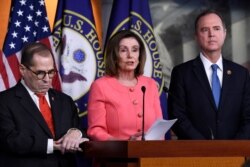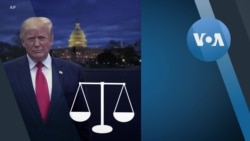U.S. President Donald Trump violated the country's spending law last year when he temporarily withheld $391 million in congressionally approved military aid to Ukraine while at the same pressing Kyiv to launch investigations to benefit himself politically, a government watchdog agency concluded Thursday in a decision that is at the heart of the impeachment case against the U.S. leader.
Trump released the assistance that Ukraine wanted to help fight pro-Russian separatists in the eastern part of the country in September after a 55-day delay without Ukrainian President Volodymyr Zelenskiy opening an investigation into former Vice President Joe Biden, one of Trump's top 2020 Democratic challengers, and his son Hunter Biden's lucrative work for a Ukrainian natural gas company.
But after an investigation, the Government Accountability Office ruled that "Faithful execution of the law does not permit the president to substitute his own policy priorities for those that Congress has enacted into law." It said that the Trump-controlled U.S. budget agency blocked release of the money "for a policy reason," which is not allowable under U.S. law.
The ruling by the GAO came less than two hours before the formal start of Trump's Senate trial on two articles of impeachment, that Trump abused the office of the presidency by trying to get Zelenskiy to open the Biden investigations while withholding the military aid and then obstructing congressional efforts to investigate Trump's Ukraine-related actions.
Senate trial
Seven lawmakers from the House of Representatives, called managers of the case against Trump, formally presented the articles of impeachment at a solemn midday reading in the Capitol. House Intelligence Committee chairman Adam Schiff read the charges against the country's 45th president in what is only the third Senate impeachment trial in the 2½ centuries of U.S. history.
Later, Chief Justice John Roberts of the U.S. Supreme Court was sworn in to preside over Trump's trial, and moments later he swore in 99 of the 100 members of the Senate to act as jurors to decide Trump's fate. (Senator James Inhofe of Oklahoma was absent because of a family emergency; he will take the oath next week, when the trial begins.) The oath the lawmakers took said they are to administer "impartial justice," although a substantial number of the senators have long declared they will either vote to convict Trump or to acquit him.
With the preliminaries out of the way, the impeachment trial is expected to start in earnest next Tuesday at 1 p.m. in the Senate chamber.
The Office of Management and Budget and the White House rebuffed the GAO's conclusion.
"We disagree with GAO's opinion," an OMB spokeswoman said. "OMB uses its apportionment authority to ensure taxpayer dollars are properly spent consistent with the president's priorities and with the law."
A senior Trump administration member said the GAO finding was "a pretty clear overreach as they attempt to insert themselves into the media's controversy of the day."
With Republicans holding a 53-47 majority in the Senate, Trump remains all but certain to be acquitted and remain in office since conviction on either of the impeachment articles and Trump's ouster requires a two-thirds majority vote. Some Republicans have criticized Trump's bid for the Biden investigations, but no Republican has called his conviction and removal from office less than a year before he faces voters again in the November national election as he tries to win a second term in the White House.
Some Democrats, however, quickly latched on to the GAO report as more evidence supporting Trump's alleged abuse of power.
Sen. Chris Van Hollen of Maryland, told CNN, "This will definitely be part of the trial. It establishes that the president violated U.S. law. The president abused his power by this illegal action."
White House officials are predicting a short trial of no more than two weeks and Trump's quick acquittal. But the proceeding could extend much longer if Democrats can persuade at least four Republican senators to vote with them to call new witnesses who did not testify during the weeks of investigations carried out by the Democrat-controlled House.
Witnesses
Democrats want to question former national security adviser John Bolton and acting White House chief of staff Mick Mulvaney about their knowledge of Trump's actions pressing Ukraine for the Biden investigations. Some Republican lawmakers say that if that happens, they want to subpoena either or both of the Bidens, as well as the still-unidentified government whistleblower who first disclosed Trump's July 25 overture to Zelenskiy to "do us a favor" by investigating the Bidens.
Trump's release of a rough transcript of his conversation with the Ukrainian leader showed that the basic facts of the whistleblower's complaint against Trump — that he was seeking an investigation of a political rival — proved to be accurate, despite Trump's claims to the contrary.
As the impeachment drama has unfolded in Washington, Trump has almost daily ridiculed the Democrats' efforts targeting him, calling the investigation unfair and a hoax. But as the House lawmakers prosecuting the case against him at the U.S. Capitol arrived in the Senate, Trump was silent on Twitter about the case.
Senate Majority Leader Mitch McConnell said the final step Thursday is to notify the White House and "summon the president to answer the articles and send his counsel."
House Speaker Nancy Pelosi signed the articles of impeachment at a ceremony Wednesday, moving the process forward after delaying for about a month as House Democrats tried to get Senate leaders to agree to allow testimony from new witnesses during the trial.
McConnell has resisted calling witnesses, saying that decision would come later in the trial.
As Pelosi announced the impeachment managers at a morning news conference, Trump tweeted the impeachment was “another Con job by the Do Nothing Democrats.”
White House ready
A senior administration official told reporters the White House is ready for the trial "because the facts overwhelmingly show that the president did nothing wrong."
White House spokeswoman Stephanie Grisham said Trump "looks forward to having the due process rights in the Senate that Speaker Pelosi and House Democrats denied to him, and expects to be fully exonerated."
This is the third time in the country’s 244-year history a U.S. president has been impeached and targeted for removal from office.
Andrew Johnson in 1868 and Bill Clinton in 1998 were both impeached by the House but acquitted in Senate trials. A fourth president, Richard Nixon, resigned in 1974 in the face of certain impeachment in the Watergate political corruption scandal.









